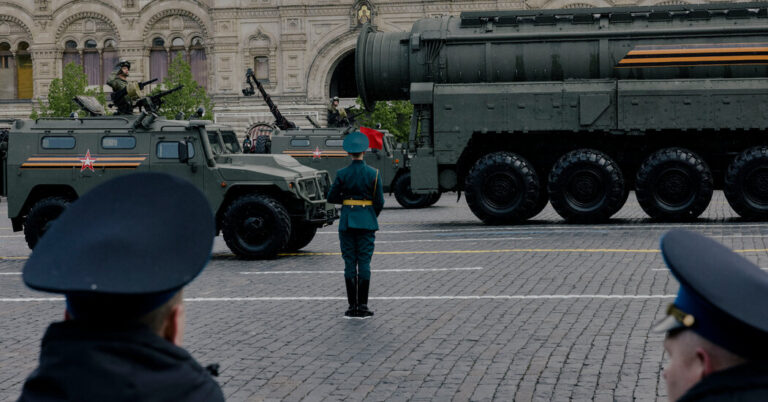The Biden administration on Wednesday announced a set of new financial sanctions aimed at severing the rapidly expanding technology ties between China and Russia, which U.S. officials see as the backdrop to a broader effort to rebuild and modernize Russia’s military amid the country’s war with Ukraine.
The measures were announced just before Biden leaves Russia for a meeting of the Group of Seven industrialized nations in Italy, where renewed efforts to undermine Russia’s economy are set to be at the top of the president’s agenda.
The effort has become much more complicated over the past six to eight months as China, previously a bystander, has increased its exports of microchips, optical systems for drones and components for advanced weapons, U.S. officials say. So far, though, Beijing appears to be heeding Biden’s warnings against arms sales to Russia as the U.S. and NATO continue to supply weapons to Ukraine.
Announcing the new sanctions, Treasury Secretary Janet L. Yellen said in a statement that “Russia’s military economy is deeply isolated from the international financial system, and the Kremlin’s military desperately needs access to the outside world.”
At the heart of the new measures are expanded “secondary” sanctions that would give the US the power to blacklist banks around the world that do business with already sanctioned Russian financial institutions, aimed at preventing smaller banks, particularly in China, from helping Russia finance the war.
The Treasury Department also imposed restrictions on the Moscow stock exchange to prevent foreign investors from backing Russian defense companies. The sanctions hit several Chinese companies that are accused of helping Russia access critical military equipment, including electronic devices, lasers and drone parts.
Secretary of State Antony J. Blinken also said Wednesday that the State Department was imposing sanctions on more than 100 entities, including companies “involved in developing Russia’s future energy, metals, and mining production and export capabilities.”
“We will continue to use all tools at our disposal to prevent Russia from exploiting the international financial system to wage war, to disrupt the support network for Russia’s defense-industrial base, and to increase the burden on Russia as he carries out his aggression in Ukraine,” he said, referring to Russian President Vladimir V. Putin.
While the measures expand the scope of the U.S. sanctions program, the Biden administration has so far refrained from imposing sanctions on Chinese or European banks it believes are supporting Russia. The new measures do not restrict banks from facilitating transactions related to Russian energy exports, which the Biden administration has allowed to continue due to concerns that restricting them could fuel inflation.
Biden has tried before to cut off supplies and funds to Russia, and overestimated the impact. In March 2022, shortly after the war began, he announced his first set of monetary measures, declaring that “as a result of these unprecedented sanctions, the ruble was almost immediately reduced to rubble.” But that did not happen. The ruble crashed for a time, then recovered, and although it is not as strong now as it was a year ago, the Russian economy continues to grow on the strength of war-related growth.
Much of this is due to efforts by China, which buys Russian oil, often at below world prices, and has stepped up sales of dual-use products, such as microelectronics and software needed to build weapons systems, drones and air defense systems.
The result has been the rise of a parallel war economy involving Russia, China, Iran and North Korea. Many of the sanctioned companies are based in Hong Kong or across the border in China’s tech-manufacturing hub of Shenzhen. But administration officials insist they can this time cut off deepening commercial ties.
The United States has already imposed sanctions on more than 100 Chinese companies that have aided Russia, but so far the sanctions have done little to deter Chinese companies or government.
By announcing new restrictions on Chinese companies, the Biden administration hopes to encourage European countries and perhaps Asian allies to take similar measures.
Mr. Blinken discussed the issue with European leaders at a NATO meeting in Prague last month, and U.S. officials intend to put it on the agenda for a summit in Washington in July that is expected to include not only member states but also the leaders of Japan, South Korea, New Zealand and Australia, U.S. allies in Asia who are part of a Washington-led coalition to counter China’s military buildup.
Blinken also warned that Beijing’s support for Russia’s defense industry would undermine friendly relations with European countries.
Speaking at a May 31 press conference in Prague, Blinken said that while China has refrained from providing arms to Russia, like North Korea and Iran, Chinese companies are exporting “materials that are essential for Russia to accelerate its production of tanks, missiles and artillery shells.”
He noted that 70 percent of the machine tools and 90 percent of microelectronics imported by Russia come from China.
“Today we heard one ally after another express their deep concerns on this issue, and what we have shared with our Chinese counterparts in Beijing has become even clearer: on the one hand, China cannot be expected to improve relations with European countries, while on the other hand it is fomenting the biggest threat to European security since the end of the Cold War,” he said.

